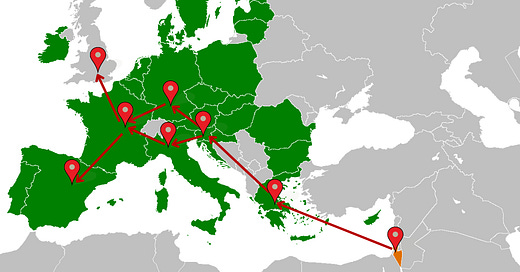How does the word Yeshu turns into Jesus?
This exposition is primarily supported by Orthography- modern and old.
Introduction
I was reading my Bible till come to my mind what was the Hebrew word of Jesus? but before I search, I already have knowledge about languages as I’m a linguist and long time having conversations to foreign people (Romanian, Spanish, Portuguese, English, etc.) in social media. I was curious to know, therefore, I search online then I found “Yeshu” and “Yeshua”. The question is that “How does the Hebrew turn into English?”, in order to find that, I pray to God to track. After done praying, I hear voice “Start from Greek up”, well, the sayings are understandable. There were two that I found “Yeshu” and “Yeshua”. And, I start first to track “Yeshu”… see tracking below:
Modern Orthography
Because of languages, become the reason why the name of the Messiah/Christ has a different spellings but the same meaning. In order to find and answer accurately Orthography will solve.
Expositions
Yeshu (Hebrew) _ Spelling: [] Pronunciation: “Ye-shu”
[The carried name of the Messiah is Yeshu]
Iisoús (Greek)_ Spelling: Ιησούς_ Pronunciation: “Eey-shoo'ws”
[In Greek the origin of putting “s” to make it more masculine]
Jezus (Slavic, Slovene)_ Pronunciation: Yey-zus
Gesù (Italian)_ Pronunciation: (Dze-zu)
Jesus (Germanic)_ Pronunciation: (Ye-zus)
Jésus (French)_ Pronunciation: (Zheyz-yo)
Jesús (Spanish)_ Pronunciation: (He-sus)
Jesus (English, UK)_ Pronunciation: (Je-sus)
Old Orthography
This part are tricky because languages and its words has also a history. That is the reason why in dictionaries sometimes it states its old and middle like the English word “widow”, Old English “wuduwe” and Middle English “widewe”. This happens because there is a presence of modding. In the Philippine History, the country was invaded by Spain and later on by United States, of long invasion there are influences and adoption, especially, to the language. “May possibility na maka trabaho sija didto” as you can see there is English and Spanish that were used. In reflection to the odd History of J, I, U and V. Before, J and I play both role either be a consonant or a vowel, U and V, likewise.
Behind the Tracking
Well, I start tracking and translating (by a pen) the Greek word of Jesus “Ιησούς”- Iisoús to the upper neighbor country of Greece; Macedonia, Albania, and Bulgaria. Then the translations I got I translate (up) to others till I reach to central, southern and northern Europe. And I got 34 translations based on existing letters and orthography of every country. After done, I pick countries serve as to be representatives in order to make the tracking simple.
Note: if you want to translate, start where it begins. From Greek up, never to any to make it not confusing.
(This is partial…)






